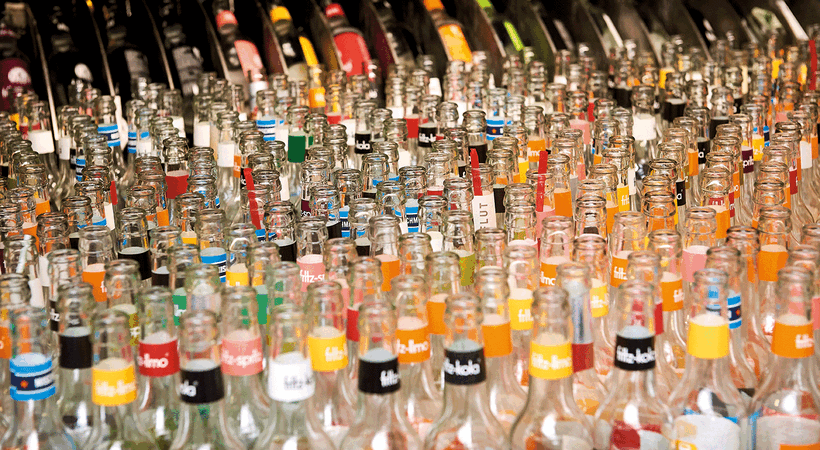Set up by two childhood friends after finishing university in 2003, fritz-kola is proud to sell its beverage in glass bottles. George Lewis spoke to Bjorn Knoop* about why glass is the number one choice for its soft drinks.
“Glass is part of our DNA, it’s part of our founding story”, states Bjorn Knoop, who leads the sustainability team at fritz-kola, a soft drinks company based in Hamburg, Germany.
Mr Knoop explained that with glass is at the heart of the business even in the early days when the packaging trend was for alternative materials.
The company is glad it stuck to its morals, with sustainability ‘getting into the heads of people and customers feeling the importance of sustainability’.
The company’s 330ml glass cola bottles were only outsold by Coca-Cola in German shops last year, with around 71 million glass bottles sold compared with 74 million at Coke.
But unlike Coca-Cola, fritz-kola only uses glass, and according to Mr Knoop, this will always be the case.
He said: “I don’t think we will ever be in a plastic bottle or a can. When everyone was going away from glass, we stuck to it.”

The beginning
The company was set up in 2003 by two childhood friends Mirco Wiegert and Lorenz Hampl after finishing university in Hamburg, Germany.
When fritz-kola was founded, there was big political discussions in Germany between the Social Democrat/Green coalition government on what can be done to increase recycling rates in Germany.
A deposit return scheme (DRS) for single-use beverage containers was developed and according to statistics from the Guardian in 2018, global drinks producers are estimated to have made more than €3bn (£2.6bn) since the introduction of the DRS scheme.
At the time of its inception, fritz-kola was going against the trend for single use beverage containers by having a glass container that could be returned.
Mr Knoop believes that ‘even in that time, people knew that a refillable glass bottle was better than a single use plastic bottle’.
Fast-forward 17 years, the concept of using glass is now starting to change due to environmental concerns. Mr Knoop admits that ‘we are lucky now to be in this position when the world is fighting against plastic’.

Fritz-kola has three bottle designs. The most sold 330ml bottle, an individual on-trade 200ml bottle and a 500ml non-individual pool bottle, all of which are manufactured by the Ardagh Group, for whom fritz-kola has had a long-term partnership with. All these bottles are manufactured from Ardagh’s plants in Germany.
In the last two years, fritz-kola has worked intensively with Ardagh, designing the 200ml bottle with an agency in Berlin that is 100% recyclable, returnable and uses reusable glass packaging, which was created to reflect Fritz’s brand values.
The bottle is designed to be returned and refilled up to 20 times before being recycled.
Mr Knoop said Ardagh was fritz’ ‘sparring partner’, and were consulted all the time regarding the materials, stability, sizes, logistics of the bottle.
Fritz-kola chose to work with Ardagh due to its presence in Germany and wanted to source glass locally. Fritz is always looking to create new long-term relationships with different suppliers across Europe.
With sustainability at the core of the company’s values, fritz-kola looks at what the manufacturers are doing to lower emissions in the manufacturing process before deciding whether to form a working relationship.
Mr Knoop said: “We want to evolve together with our partners. There are quite a few innovations in glass such as the reduction in its weight so it’s good to work with other manufacturers.
“Fritz-kola really needs to work with all them to achieve these innovations.”

Fritz-kola predominantly supplies its beverage across Germany, but due to the location the bottling plants, the company is able to export into the Netherlands and Poland.
But interestingly, not only is the beverage being exported to different countries, the company is hoping to persuade national governments to look at using a refillable system similar to the one used in Germany.
Fritz-kola’s future plans includes further supply to Spain, the UK and parts of Eastern Europe. But to maintain its sustainability goals, fritz-kola is hoping to be able to bottle the beverages in these countries, in order to cut down on emissions.
Covid
Like many businesses, fritz-kola has also been affected by the Covid-19 crisis. With a substantial part of its beverage demand from ‘on trade’ bars and restaurants, which shut completely or had trade reduced dramatically during lockdowns, it had to lean more on ‘off trade’ sales to see the company through challenging times.
Mr Knoop said: “The off trade is helping us support the on trade at the moment, but of course we eventually want to get back to having good demand for both on and off trade.”
Fritz-kola is trying to help in any way it can, such as creating solidarity t-shirts to help generate income for local bars.
Mr Knoop admits he believes that ‘we will see a lot of bars and clubs go down’ due to Covid-19.
Born to be different
When asked what the future holds for fritz-kola, with this dependant on the virus being in control, Mr Knoop says the plan is to ‘stick to glass, fight plastic pollution and fight for a more sustainable beverage industry’.
He hopes the company can push forward to expand exports of the soft drink range, and to see an increased use of refillable bottle systems.
Mr Knoop says the company was “born to be different”, and future plans may change as businesses adapt to the Covid-19 crisis. But one thing will remain constant for the company, and that is Fritz Kola will always be sold in glass containers.
*Maintenance/Head of Sustainability
fritz-kola, Hamburg, Germany





